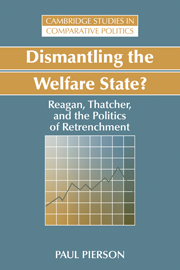Introduction: conservatives and the welfare state
Published online by Cambridge University Press: 05 June 2012
Summary
We live in an age of big government. With the enormous postwar expansion of programs providing income maintenance, health care, and housing, the welfare state became an integral part of all the advanced industrial democracies. However, whereas the development of modern welfare states modified the workings of the market, poor economic performance in the past two decades reaffirmed the tight link between the health of the private economy and the political status of social programs. High unemployment slowed revenue growth while fueling pressures for higher spending. Persistent fiscal strain dramatically altered the welfare state's position. If until recently observers sought to explain the welfare state's inexorable expansion, the question now is how welfare states are adapting to an atmosphere of austerity.
For some governments, this adjustment was a painful necessity. Others, however, saw a contraction of the welfare state as an end in itself. In many countries a conservative resurgence accompanied the economic turmoil of the late 1970s. Conservative parties gained strength, and within these parties leadership shifted to those most critical of the postwar consensus on social and economic policy. These newly ascendant conservatives viewed the welfare state as a large part of the problem. They argued that social programs generated massive inefficiencies, and that financing them required incentive-sapping levels of taxation and inflationary budget deficits. In short, conservatives viewed retrenchment not as a necessary evil but as a necessary good.
- Type
- Chapter
- Information
- Dismantling the Welfare State?Reagan, Thatcher and the Politics of Retrenchment, pp. 1 - 10Publisher: Cambridge University PressPrint publication year: 1994



